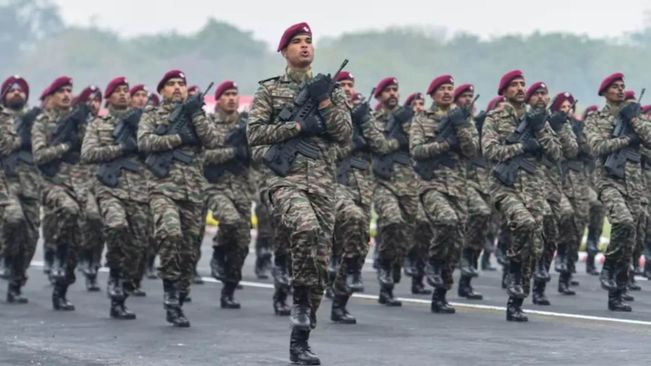The statement is a response to opposition leaders like Rahul Gandhi and Akhilesh Yadav, who have accused the National Democratic Alliance (NDA) government of institutionalized "discrimination" in the country's Armed Forces.
Their statements have triggered an intense debate on social media, with many critics of the scheme asking Prime Minister Narendra Modi to roll back the reform, which the Indian Defense Forces have said that it will transform them into an agile, nimble, and far more battle-ready military.
Notably, the average age of a soldier in the Indian Defence Forces is 32, which they aim to bring down to 26 through the scheme. This decision doesn't go well with the opposition.
However, Khandare has explained the reason why cutting down the average of a soldier is so important for the Armed Forces, saying a trained young soldier will be far more capable of taking on challenges such as cyber warfare, critical for the well-being of a nation.
"The average age of soldiers in the Indian military was higher than that of many other global armed forces, which could compromise operational effectiveness," explained Lt. General Khandare.
He highlighted that by lowering the average age of soldiers from 32 to 26 years and infusing the forces with agility, resilience, and technological adeptness, the Indian army would increase their operational effectiveness.
"Younger soldiers are more adaptable to new technologies and can engage in high-intensity operations with greater stamina and resilience. The rigorous training Agniveers undergo includes leadership development, technical skills, and advanced combat techniques, ensuring they are prepared for a wide range of security challenges," Khandare reckoned.
Moreover, through the scheme, India will have a large reservist force, which can be called upon to fight in times of a long two-front war with China and Pakistan.
Long wars are a reality now and the Russia-Ukraine war, which is ongoing for almost three years, is a prime example. And India has to be prepared for such conflicts. In such a scenario, the role of Agniveers, who will be phased out from the country's armed forces after four years, becomes crucial.
In this context, Khandare pointed out that in case of wars, India would need a large number of reservists in officer ranks and subordinate rank and file. The Indian Army needs competent, young, and healthy reservists. Large casualties have taken place in recent global conflicts.
"For national security, the scheme significantly rejuvenates the Indian Armed Forces by creating a younger, more agile, and technologically proficient military," said Khandare.
"This shift is essential in an era of evolving geopolitical tensions, terrorism, cyber threats, and technological advancements," he stressed.
"The scheme's emphasis on recruiting individuals with technical skills ensures that the armed forces remain at the cutting edge of military technology, enhancing their operational capabilities," he concluded.
The Indian Army took to social media Saturday to dispel doubts about the training modules that Agniveers selected through the Agnipath scheme need to undertake.
Discover the rigorous journey of transformation into a brave and skilled soldier. From demanding obstacle courses to combat training, witness the dedication and resilience of #Agniveers to join the elite force of #IndianArmy and serve the nation with honor.#AgniveerTraining… pic.twitter.com/6wItUSNLnh — NORTHERN COMMAND - INDIAN ARMY (@NorthernComd_IA) August 3, 2024
In the post, the Army said: "Discover the rigorous journey of transformation into a brave and skilled soldier. From demanding obstacle courses to combat training, witness the dedication and resilience of Agniveers to join the elite force of #IndianArmy and serve the nation with honour."
The video comes days after Finance Minister Nirmala Sitharaman's remarks in Parliament where she reiterated the government's commitment to the Agniveer scheme, saying it aims to maintain the battle readiness and youthfulness of the armed forces.
Highlighting the importance of the scheme in ensuring national security, she drew parallels with countries like the US and UK, where soldiers serve shorter terms to maintain a youthful and agile force.
She stressed that the Agniveer scheme aims to recruit individuals aged 17-21, resulting in a significantly younger force. Sitharaman assured that the scheme has been implemented in consultation with the armed forces and will not cause any distortions.
Notably, the Agniveer Scheme was introduced in India in June 2022 to reduce the aging profile of troops in the tri-services - Army, Navy, and Air Force.
Read More: National News















